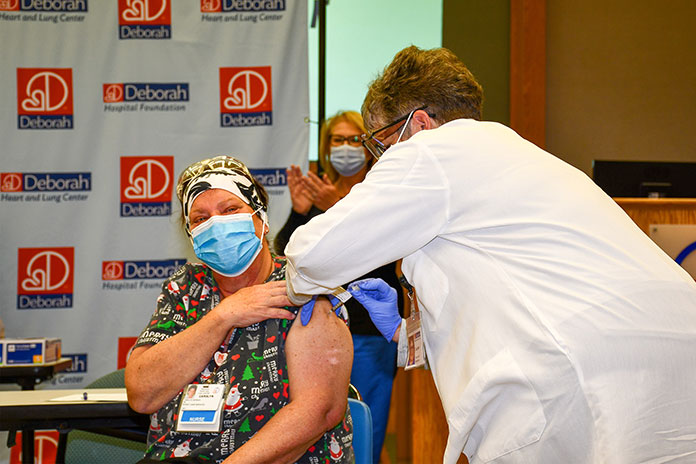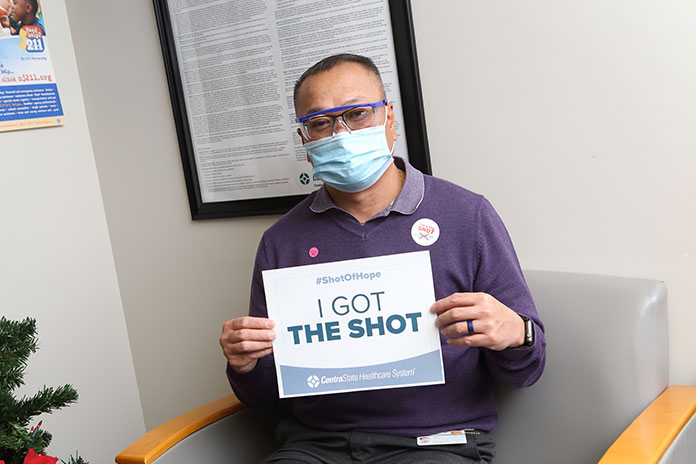
OCEAN COUNTY – With coronavirus cases increasing around the state and country, the only bright spot appears to be that vaccinations are on the way.
Like those everywhere, Ocean County residents are hoping the vaccinations lead to the end of the pandemic. They expressed their thoughts to a JerseyShoreOnline.com reporter outside various local stores.
While most didn’t mind talking about the subject, not all wanted to offer up their name. One senior from Toms River said “I’d get it, 100%.” A young woman proclaimed, “I want to get it.”
Not all those who posed the question were as optimistic. Jody Lamberti of Seaside Heights commented, “I don’t trust it. I don’t even get a flu shot.”
Kristin Waller of Toms River said she was usually more cautious about vaccinations but said, “I travel a lot and I couldn’t travel as the airlines are said to be requiring it so I will be getting it.”
Joe Andreola also of Toms River, said “I would take it. This situation (the pandemic) though has been blown out of the water. I think there is more to this than just the coronavirus.” Andreola said he was suspicious of certain aspects of the pandemic lockdown but was happy that vaccines would soon be available to the public.
Veronica Laureigh, a resident of Lacey who serves as the township’s clerk/business administrator said, “I will definitely take it when it is available.”
Garden State residents have been told not to leave the state. “Just don’t travel. No one should be traveling out of state beyond what is essential for your daily life,” Governor Phil Murphy said.
He and health officials around New Jersey renewed their call for everyone to maintain social distancing, wear their face masks and to frequently wash their hands. The second wave of COVID-19 infections continue hitting the population of New Jersey and the only way to combat it is for people to limit transmission of the virus.

While the vaccine has arrived in some areas to be distributed to first responders and at-risk residents, it will take several months for millions of people to become vaccinated. Earlier this month the governor signed an executive order that changes the state’s immunization information system from an opt-in to an opt-out system for the coronavirus vaccine.
No one will be forced to take the vaccine according to the Governor, but this order will make it more efficient for those who seek to be vaccinated. Murphy added this would also assist people to get the same sourced vaccine for their second doses.
Thirty days following the ongoing public health emergency end, people can opt back out of the program, Governor Murphy said. He noted that several hospitals in the state are preparing to receive around 76,000 does of the Pfizer vaccine.
The Federal Drug Administration’s emergency approval was recently granted. The first round of vaccinations won’t cause the pandemic outbreak to abruptly end however, the governor said.
“The presence of a vaccine in our state does not mean that we can flip a light switch and remove all restrictions,” Murphy said. He said it would require months and “millions of New Jerseyans getting vaccinated.”
The death count related to the pandemic stands at more than 15,425 statewide. “The pandemic is nowhere near over,” the governor said noting that with Christmas coming up soon, people needed to be particularly careful.
Ocean County Health Department (OCHD) Public Health Coordinator/Health Officer Daniel Regenye noted that while many people are finding comfort knowing a vaccine has finally been approved by the FDA, for some, that news brings little reason for holiday cheer.
“We certainly understand that some people have reservations about getting vaccinated. It is best to get the facts behind the benefits of a COVID-19 vaccine and that they not get misled by unreliable information,” Regenye said.

Regenye said the first vaccine approved for emergency use authorization by the FDA – and developed by Pfizer – went through all the required steps in the testing and approval process. Vaccine safety and ensuring it works is always top priority and the Centers for Disease Control and Prevention (CDC) provides a list of reasons to get vaccinated:
- COVID-19 vaccines were carefully evaluated in clinical trials and have been authorized or approved only if they make it substantially less likely you’ll get COVID-19.
- Based on what we know about vaccines for other diseases, experts believe that getting a COVID-19 vaccine may help keep you from getting seriously ill even if you do get COVID-19.
- Getting vaccinated yourself may also protect people around you, particularly people at increased risk for severe illness from COVID-19.
- Experts continue to conduct more studies about the effect of COVID-19 vaccination on severity of illness from COVID-19, as well as its ability to keep people from spreading the virus that causes COVID-19.
- COVID-19 can have serious, life-threatening complications, and there is no way to know how COVID-19 will affect you. And if you get sick, you could spread the disease to friends, family, and others around you.
- Clinical trials of COVID-19 vaccines must first show they are safe and effective before any vaccine can be authorized or approved for use. The known and potential benefits of a COVID-19 vaccine must outweigh the known and potential risks of the vaccine for use under what is known as an Emergency Use Authorization (EAU).
- Getting COVID-19 may offer some natural protection, known as immunity. But experts don’t know how long this protection lasts, and the risk of severe illness and death from COVID-19 far outweighs any benefits of natural immunity. COVID-19 vaccination will help protect you by creating an antibody response without having to experience sickness.
- Both natural immunity and immunity produced by a vaccine are important aspects of COVID-19 that experts are trying to learn more about, and CDC will keep the public informed as new evidence becomes available.
- Wearing masks and social distancing help reduce your chance of being exposed to the virus or spreading it to others, but these measures are not enough. Vaccines will work with your immune system so it will be ready to fight the virus if you are exposed.
- The combination of getting vaccinated and following CDC’s recommendations to protect yourself and others will offer the best protection from COVID-19.
- Stopping a pandemic requires using all the tools we have available. As experts learn more about how COVID-19 vaccination may help reduce spread of the disease in communities, CDC will continue to update the recommendations to protect communities using the latest science.
Regenye said for those people already convinced of the benefits, the good news is that the first shipments of the vaccine are expected to arrive in the coming weeks. He stressed the need for patience in waiting for inoculations as the vaccine will be distributed in phases.
“We know right now that hospitals and long-term care facilities will be part of the first phase which could start later this month with the following phases stretching into the first half of 2021. In the meantime, we still urge people to adhere to the current safety protocols as the best way to mitigate the spread of COVID-19,” Regenye said.
The OCHD is providing a general COVID-19 Information Call Hot Line for residents and clinicians to answer questions regarding the coronavirus. The number is 732-341-9700 ext. 7411.
The NJDOH (NJPIES) hotline is available for questions around the clock at 1-800-222-1222 or by dialing 2-1-1. Other related sources; for medical COVID-19 questions call 1-800-962-1253 or Text NJCOVID to 898-211 to receive alerts.
To learn more about COVID-19 and vaccine facts visit cdc.gov, and ochd.org.







